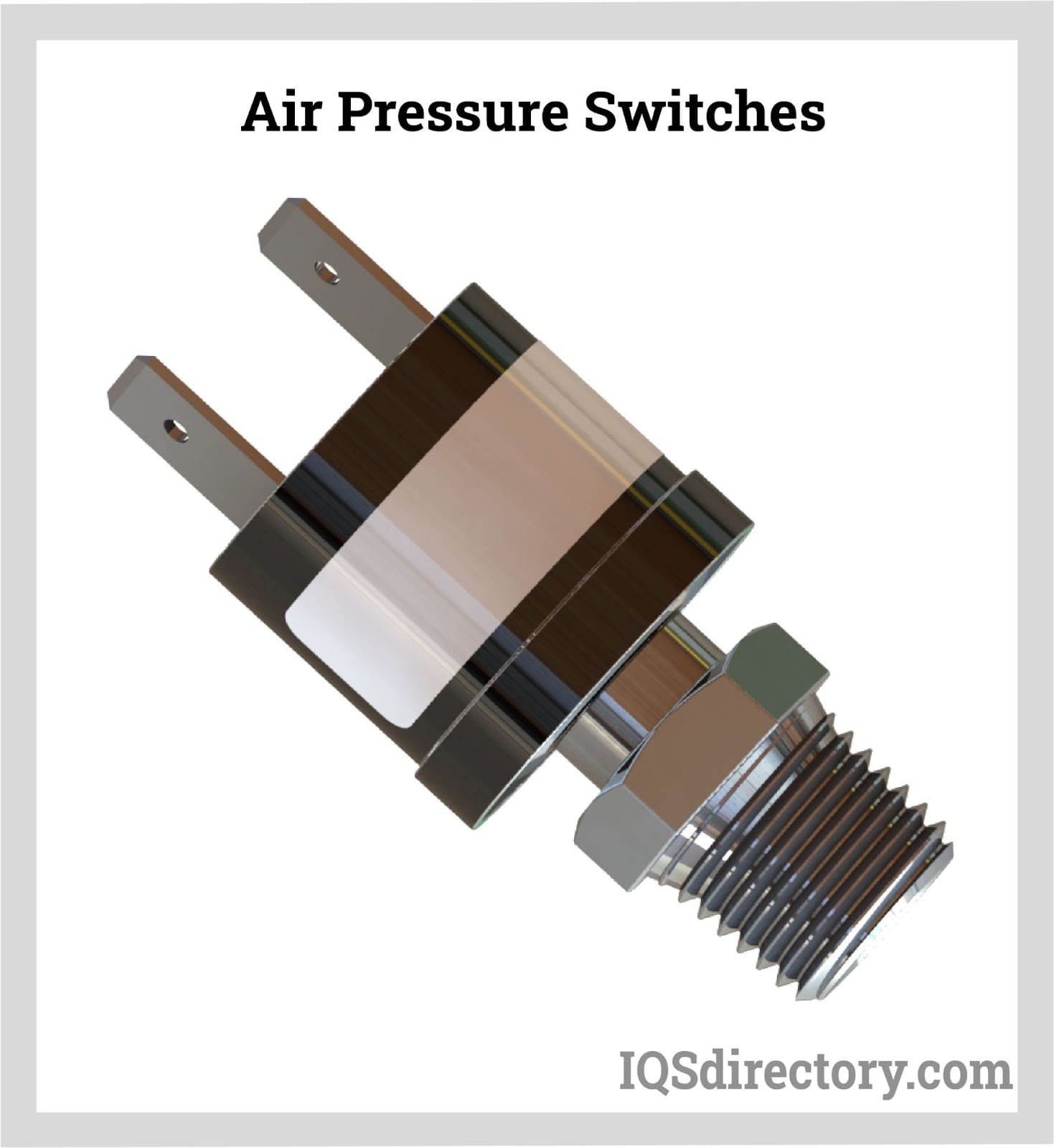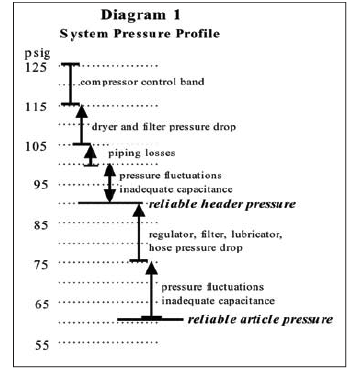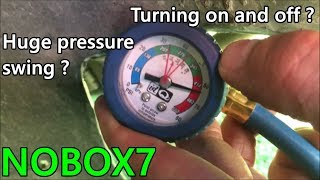When the compressor turns on, the AC pressure drops due to the sudden demand for refrigerant within the system. This can indicate a potential issue with the compressor or a refrigerant leak.
As a homeowner, experiencing a drop in AC pressure when the compressor activates can be concerning. Understanding the potential causes and solutions for this issue can help you address the problem effectively. By learning more about how the AC system operates and the factors that can influence pressure fluctuations, you can make informed decisions about maintenance and repairs.
We will explore the reasons behind pressure drops when the compressor turns on, as well as provide tips for troubleshooting and resolving this issue. Whether you are a DIY enthusiast or prefer to seek professional help, this information will empower you to maintain a comfortable and efficient indoor environment.

Credit: www.youtube.com
Common Causes Of Ac Pressure Drops
An AC pressure drop when the compressor turns on can be a sign of various issues. These pressure drops can be caused by common factors such as a refrigerant leak, faulty expansion valve, or blocked/clogged refrigerant lines.
Refrigerant Leak
A refrigerant leak is a common cause of AC pressure drops. The loss of refrigerant in the system can lead to a decrease in pressure as well as a decrease in cooling efficiency.
Faulty Expansion Valve
A faulty expansion valve can also result in a pressure drop when the AC compressor kicks in. If the expansion valve is malfunctioning, it may not regulate the flow of refrigerant properly, causing pressure fluctuations.
Blocked Or Clogged Refrigerant Lines
Blocked or clogged refrigerant lines can restrict the flow of refrigerant, leading to a drop in pressure when the compressor starts running. This can be due to debris, dirt, or other obstructions in the lines.
Effects Of Ac Pressure Drops
The AC pressure drops can have significant impacts on the performance and durability of your air conditioning system. Below are some of the key effects:
Reduced Cooling Efficiency
- Bilower pressure leads toreduced cooling efficiency and longer cooling time.
- This results in a system that struggles to maintain optimal temperatures.
Increased Energy Consumption
- Whenpressure drops, the AC compressor works harder to maintain desired temperatures.
- This spike in energy consumption leads to higher electricity bills.
Potential Damage To Compressor
Troubleshooting Ac Pressure Drops
If you notice that your AC pressure drops when the compressor turns on, it is essential to identify and address the underlying issue promptly. AC pressure drops can indicate various problems, such as refrigerant leaks, issues with the expansion valve, or blocked or clogged refrigerant lines. In this section, we will discuss the troubleshooting steps to help you identify and resolve these problems effectively.
Check For Refrigerant Leak
A refrigerant leak can cause a drop in AC pressure when the compressor turns on. To check for a refrigerant leak, you can:
- Visually inspect the AC system for any signs of oil stains, coolant residue, or greasy spots around the refrigerant lines, connectors, or components.
- Use a refrigerant leak detector to identify leaks. Follow the manufacturer’s instructions for proper usage.
- If a leak is detected, ensure to repair the leak and recharge the system with the appropriate amount of refrigerant.
Inspect The Expansion Valve
The expansion valve regulates the flow of refrigerant into the evaporator coil. If the expansion valve is faulty or malfunctioning, it can lead to pressure drops. Consider the following steps to inspect the expansion valve:
- Inspect the expansion valve for any signs of damage or blockage.
- If the valve is damaged, replace it with a new one to ensure proper refrigerant flow.
- Additionally, clean the expansion valve thoroughly to remove any debris or dirt that may be obstructing the flow of refrigerant.
Clear Blocked Or Clogged Refrigerant Lines
Blocked or clogged refrigerant lines can impede the proper flow of refrigerant, resulting in pressure drops. Follow the steps below to clear any blockages:
- Inspect the refrigerant lines for any visible debris, dirt, or obstructions.
- If blockages are found, carefully remove the obstructions using appropriate tools or cleaning techniques.
- Ensure that the refrigerant lines are clear of any debris before reconnecting them to the AC system.

Credit: www.iqsdirectory.com
Preventing Ac Pressure Drops
Preventing AC pressure drops is crucial for maintaining the efficiency and longevity of your air conditioning system. When the compressor turns on, pressure drops can lead to issues such as reduced cooling capacity and potential damage to the compressor. To keep your AC system running smoothly, it’s important to implement preventive measures that address pressure drops. Here are some key strategies to consider:
Regular Maintenance And Inspection
Regular maintenance and inspections play a vital role in ensuring that your AC system operates at optimal levels. By scheduling routine inspections with a qualified technician, you can identify and address potential issues that may contribute to pressure drops when the compressor activates. Inspecting refrigerant levels, checking for leaks, and verifying the condition of components can help maintain proper pressure levels and prevent unnecessary strain on the compressor.
Proper Refrigerant Handling
Proper refrigerant handling is essential for maintaining the stability of AC system pressure. Ensuring that refrigerant is handled and charged accurately can help prevent abrupt pressure drops when the compressor engages. Adhering to manufacturer guidelines and utilizing the appropriate refrigerant type and quantity can contribute to stable pressure levels and optimal system performance.
Avoiding Refrigerant Contamination
Avoiding refrigerant contamination is another crucial aspect of maintaining consistent pressure levels in your AC system. Preventing the entry of air or unwanted substances into the refrigerant lines can help preserve the integrity of the refrigerant and minimize the risk of pressure fluctuations. Maintaining a clean and sealed refrigerant system can contribute to stable pressure levels and overall system efficiency.
When To Seek Professional Help
If your AC pressure drops when the compressor turns on, it is recommended to seek professional help. Professional technicians can diagnose and fix the underlying issues efficiently, ensuring your AC system operates smoothly.
When to Seek Professional Help Unusual Noise or Vibrations Recurring AC Pressure Drops Inability to Identify or Fix the Problem If you notice unusual noise or vibrations coming from your AC unit when the compressor turns on, it’s a clear sign that you need to seek professional help. These symptoms may indicate a mechanical issue within the compressor or other components that require expert diagnosis and repair. Additionally, recurring AC pressure drops can be a cause for concern. If your system consistently experiences a drop in pressure when the compressor activates, it could be an indication of a refrigerant leak or an underlying mechanical problem. A qualified technician can assess the issue and provide a comprehensive solution. Moreover, if you find yourself unable to identify or fix the problem causing the AC pressure drops when the compressor turns on, it’s time to reach out to a professional. Attempting to troubleshoot complicated HVAC issues without the appropriate knowledge and tools can lead to further damage to the system. An experienced technician can accurately diagnose the problem and implement effective repairs. In conclusion, when encountering unusual noise or vibrations, recurring AC pressure drops, or an inability to identify or fix the problem, seeking professional help is crucial to maintaining the efficiency and longevity of your HVAC system.
Credit: www.airbestpractices.com
Frequently Asked Questions On Ac Pressure Drops When Compressor Turns On
Why Does The Ac Pressure Drop When The Compressor Turns On?
The AC pressure drops when the compressor turns on because the compressor is squeezing the refrigerant, reducing its pressure. This drop in pressure allows the refrigerant to evaporate, which is essential for cooling the air in the air conditioning system.
Is It Normal For Ac Pressure To Decrease When The Compressor Starts?
Yes, it’s normal for the AC pressure to decrease when the compressor starts. The compressor’s function is to compress the refrigerant, causing a drop in pressure, allowing it to evaporate and cool the air. This process is essential for the proper functioning of the air conditioning system.
What Are The Common Reasons For Ac Pressure Dropping With Compressor Activation?
Common reasons for AC pressure dropping with compressor activation include low refrigerant levels, a faulty expansion valve, or a clogged orifice tube. These issues can lead to pressure drops when the compressor starts and may require professional inspection and repair to restore proper functionality.
How Can I Address Ac Pressure Drops When The Compressor Turns On?
To address AC pressure drops when the compressor turns on, start by checking the refrigerant levels and ensuring they are at the recommended level. Additionally, inspect the expansion valve and orifice tube for any obstructions or faults. If issues persist, seek professional assistance for a thorough diagnosis and repair.
Conclusion
To summarize, understanding the reasons behind AC pressure drops when the compressor turns on is crucial in maintaining the efficiency and longevity of your cooling system. Regular maintenance, such as checking for refrigerant leaks or clogged filters, can prevent these pressure drops and ensure optimal performance.
Remember to monitor your AC’s pressure readings periodically and seek professional assistance if needed. By addressing these issues promptly, you can enjoy long-lasting comfort and savings. Keep your AC running smoothly and your home cool!
